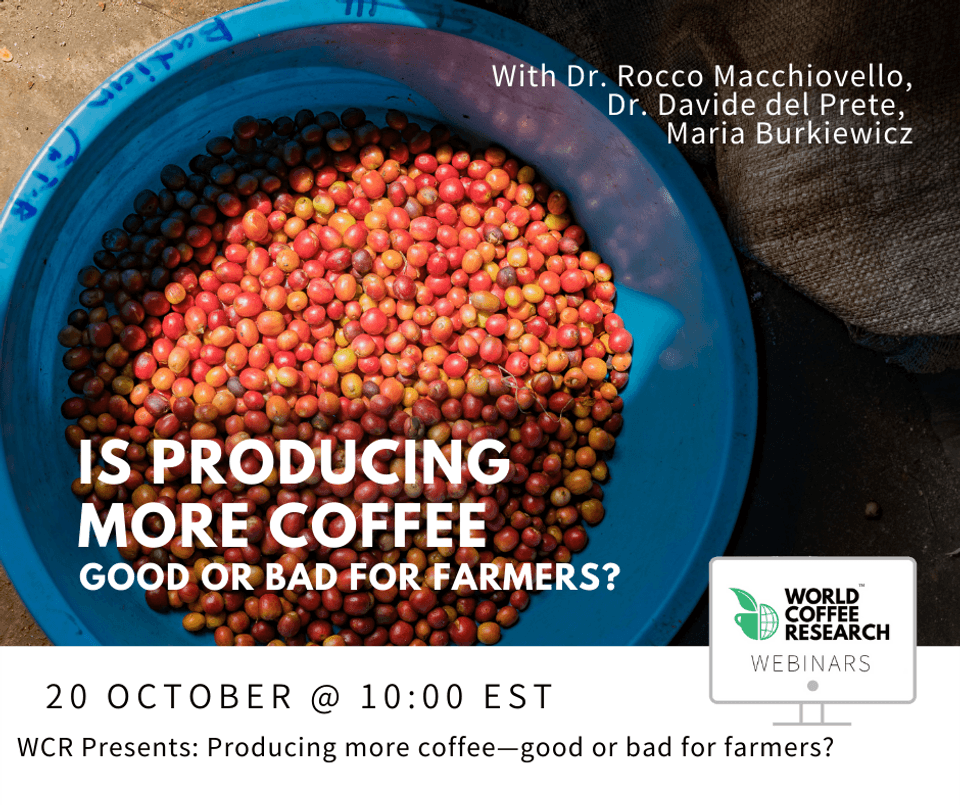
Globally, a critical driver of higher incomes for coffee farmers is increased productivity, e.g., the ability to produce more coffee given the same amount of land, labor, or capital. But if all coffee farmers around the world suddenly produced more coffee, global supply would jump and the price of coffee would decline. This is the price/yield paradox. At the heart of the paradox is the question of where the help vs. harm tipping point lies for farmers—the point at which individual income gains for farmers are erased by global price. Exploring the paradox is essential for guiding governments, institutional investors, research organizations, and even individual farmers on decisions to support farmer profitability and meet rising global demand.
In this webinar, World Coffee Research presents a new study from researchers at London School of Economics and University of Naples Parthenope, using global farmer data from Enveritas, to explore the paradox and offer insights to guide decision-making that will be critical to the future of coffee. The session will explore why measuring the agricultural productivity gap matters, including by gender and age of farmers, as well as how resource allocations can deliver different outcomes on yield and price. The session will explore differences in coffee yields around the world, as well as the implications of increasing yields for the lowest-performing farmers and the impact such increases would have on global supply and price.
Presenters
Rocco Machiavello, Associate Professor in Management, London School of Economics
Rocco Macchiavello holds a PhD in Economics from the London School of Economics and Political Science, where is currently an Associate Professor in Management. Previously, Dr. Macchiavello was a Post-Doctoral Research Fellow at Nuffield College, Oxford University, Post-Doctoral Researcher at the Harvard Kennedy School, and Professor at Warwick University. He is a Research Fellow at BREAD, CEPR, J-PAL and Lead Academic at The IGC. Dr. Macchiavello's research interests lie at the intersection of development economics, industrial organization and international trade. In partnership with governments, NGOs, and MNCs, he has conducted research in Bangladesh, Colombia, Costa Rica, Ethiopia, Kenya, India, Myanmar, Pakistan and Rwanda. Much of his current work is on the industrial organization of, and sustainable sourcing practices in, the global coffee supply chain.
Davide Del Prete, Assistant Professor of Economics at University of Naples Parthenope
Davide Del Prete is an assistant professor of economics at the University of Naples Parthenope (IT) and an economist at FAO of the UN. Davide’s research interests lie between international trade, development economics, and econometrics. His works employ sound empirical methods to seek evidenced-based policy answers addressing a wide range of issues in the field of trade and development. For his projects, Davide has collaborated with several international organizations, such as the UNCTAD, ITC, World Bank, and FAO, and numerous governments (Ghana, Ethiopia, Kenya, India, Mozambique, and Rwanda). The most recent research activities include an analysis of markets and firms in conflict-affected countries, global market power, and supply-chain resilience.
Maria Burkiewicz, Data analyst, Enveritas
Maria is a data analyst at Enveritas. She led the statistic modeling behind Enveritas’ global farmer estimates, released in 2018. Previously, she worked as a researcher in GfK Polonia, a market research Institution. She has a MSc Statistics from the University of Economics in Katowice, Poland and studied Computing at Galway-Mayo Institute of Technology in Ireland.
Carl Cervone, Cofounder, Enveritas
Carl Cervone is the Cofounder and Chief Operating Officer of Enveritas. He oversees data, technology, and global operations for Enveritas. Prior to Enveritas, Carl worked at TechnoServe, helping farmers increase their incomes and adopt more sustainable farming practices. He has a Bachelors in Environmental Science from Wesleyan University and an MBA from Columbia University.
Ric Rhinehart, Strategy Director for Agricommodities, IDH, the Sustainable Trade Initiative
Ric has spent thirty years in the coffee and tea sectors, and is now the director of strategies for the agri-commodities business unit, at IDH, the Sustainable Trade Initiative, where his focus is on global convening activities in the coffee sector. He supports IDH’s work in the coffee, tea, and cocoa sectors to take transformational action towards reaching a living income for farmers. Ric was formerly the CEO of the Specialty Coffee Association, and served on the boards of directors of World Coffee Research, the Coffee Quality Institute, and COSA. He was a delegate to the ICO Private Sector Consultative Board.